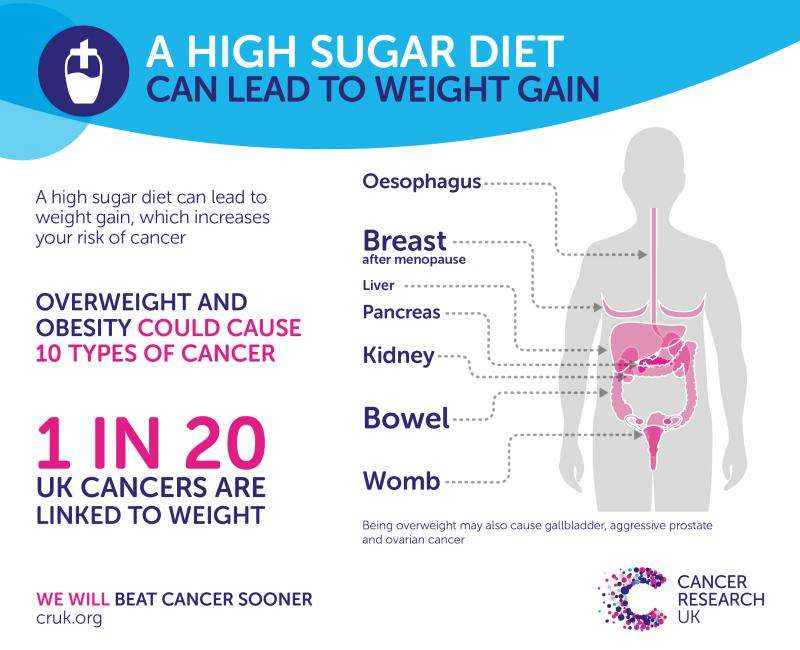Public Health England recommends halving sugar consumption targets

Sugar has been heavily sprinkled over the headlines this week. It's an ever-present ingredient in kitchen cupboards, drinks and lunchboxes up and down the country. And the UK has a particularly sweet tooth, with data suggesting we consume so-called 'free' sugars – those artificially added to food – at such high rates it can adversely impact on our health.
In 2008, the Scientific Advisory Committee on Nutrition (SACN), the body of scientific experts who advises Government on nutrition and health-related issues, was asked by Government and the Food Standards Agency to clarify the relationship between carbohydrates and health. They've published their recommendations today – and their headline statistics are punchy:
- Adults and children should get no more than 5%, down from the previous 10%, of their energy intake from 'free' sugars – this is equivalent to 5-7 teaspoons of sugar
- Sugar-sweetened beverages should be drunk as infrequently as possible by both adults and children
- The recommended fibre intake should increase to 30g per day (equivalent to about a quarter more than the old guidelines)
That's a big change – so what happens next? And how is this linked to cancer anyway?
A growing problem
Importantly, there isn't conclusive evidence that sugar itself causes cancer cells to grow or spread (despite persistent myths that claim there is). But what is crystal clear is that eating more sugary food and drink increases total energy intake, which can lead to being overweight or obese – the biggest preventable cause of cancer after smoking. Being overweight and not having a healthy, balanced diet causes 49,100 extra cases of cancer every year.
So, will the recommendations help the UK keep a healthier waistline?

Energy intake
The UK consumes too much sugar. The National Diet and Nutrition Survey shows that every age group exceeded even the previous guidelines – that people should get no more than 10% of their energy intake from free sugars. This is a particular problem for teenagers, who appear to get more than 15% of their energy intake from free sugars – three times the new guideline.
The new guidelines also reaffirm a definition for 'free sugars', which until now has not been a well-understood term. The Committee recommends that free sugars are defined as both sugars which are added to food by the cook, customer, or manufacturer (sugars like glucose and fructose), and sugars naturally present in products like honey, syrups and unsweetened fruit juices.
Halving the recommended maximum level of sugar intake is a clear statement that the Committee agrees with the evidence that reducing the amount of sugar in our diets can have clear benefits for a person's health.
Sugary drinks
At face value, fizzy drinks are an odd thing to drink. They add virtually no nutrition to your diet, help you put on weight, and can be incredibly high in sugar, sometimes containing up to 35g – or 9 teaspoons – per 330ml can.
Even so, over 5.6 million litres of sugary drinks are consumed each year in the UK. And it's young people who consume the most, with sugary drinks being responsible for about a third of a teenager's sugar intake.
So helping people, especially teenagers, to cut down on consuming sugary drinks – for example, encouraging them to replace them with sugar-free squash – is a great way to make it easier to keep a healthy weight.
Increasing fibre
Our average fibre intake in the UK is low, even falling below the previous guideline of 18g. Because of this, the Committee's recommendation of increasing the recommended fibre in our diet to 30g a day demonstrates the importance they put on eating a high fibre diet.
From a cancer-prevention point of view, we think this is a good idea, as there is evidence that high levels of fibre can reduce the risk of developing bowel cancer. More than 1 in 10 bowel cancers are linked to a low fibre diet, and if the UK had a diet high in fibre could avoid up to 5,100 cases of cancer every year. Fruit and vegetables are a good source of natural fibre and eating them is a great way to boost your fibre intake.
The report also stresses the importance of ensuring carbohydrates are 'whole grain' where possible – whole grains and cereal fibres are particularly effective in reducing bowel cancer risk.
Simple changes matter
These new guidelines demonstrate that, whilst obesity is a challenge to public health, there are a range of steps many of us can take to help reduce our weight. In turn, this can help people stack the odds of not getting cancer in their favour.
But alongside this simple lifestyle advice, there's more to do – for example on the way foods are regulated and marketed. That's why we're keenly awaiting the Government building on these recommendations as part of a comprehensive strategy on childhood obesity– due later this year – to create an environment where healthier choices become the norm.



















